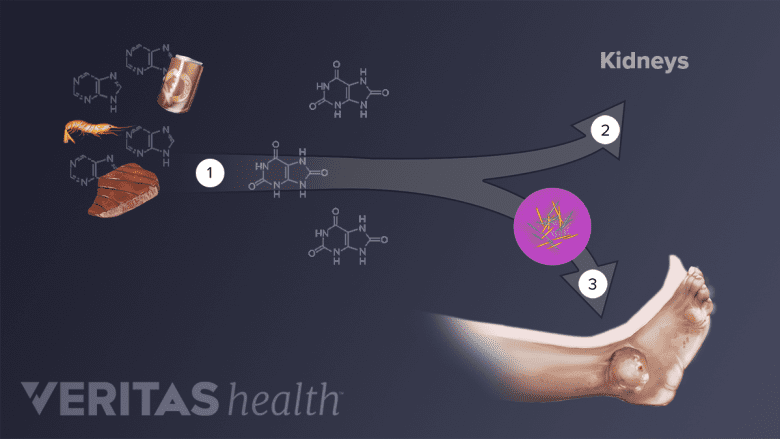Although experts do not fully understand why some people get gout and others do not, many causes and risk factors of gout are well established.

Some foods are high in purines, which turn into uric acid that can crystalize in joints, causing gout.
In This Article:
- All About Gout - Symptoms, Diagnosis, Treatment
- Gout Symptoms
- Gout Causes and Risk Factors
- Gout Diagnosis
- Gout Treatment
- Gout Prevention
Sex
Experts estimate men are 4 to 10 times more likely to have gout than women.1Slobodonick A, Toprover M, Pillinger M. Crystal Arthritis. In: Efthimiou P, ed. Absolute Rheumatology Review. Springer Nature Switzerland AG; 2020; chap 15. Accessed September 15, 2020. https://doi.org/10.1007/978-3-030-23022-7_15 Women’s risk of developing gout goes up during menopause (estrogen seems to have protective effects).2Sidari A, Hill E. Diagnosis and Treatment of Gout and Pseudogout for Everyday Practice. Prim Care. 2018;45(2):213-236. doi:10.1016/j.pop.2018.02.004,3Hak AE, Choi HK. Menopause, postmenopausal hormone use and serum uric acid levels in US women--the Third National Health and Nutrition Examination Survey. Arthritis Res Ther. 2008;10(5):R116. DOI: 10.1186/ar2519
Age
Many people have their first episode of gout between the ages of 30 and 50, and the risk of gout continues to increase with age. It is estimated that less than 3% of men under the age of 50 and nearly 12% of men aged 70 to 79 have had at least one episode of gout.4Kramer HM, Curhan G. The association between gout and nephrolithiasis: the National Health and Nutrition Examination Survey III, 1988-1994. Am J Kidney Dis. 2002 Jul;40(1):37-42. DOI: 10.1053/ajkd.2002.33911,5Lawrence RC, Felson DT, Helmick CG, et al. Estimates of the prevalence of arthritis and other rheumatic conditions in the United States. Part II. Arthritis Rheum. 2008;58(1):26-35. doi: 10.1002/art.23176
Race
African American men are nearly twice as likely to report having had gout as Caucasian men.6Fang J, Alderman MH. Serum uric acid and cardiovascular mortality the NHANES I epidemiologic follow-up study, 1971-1992. National Health and Nutrition Examination Survey. JAMA 2000;283(18):2404–10. As cited in Sidari A, Hill E. Diagnosis and Treatment of Gout and Pseudogout for Everyday Practice. Prim Care. 2018;45(2):213-236. doi:10.1016/j.pop.2018.02.004,7Hochberg MC, Thomas J, Thomas DJ, Mead L, Levine DM, Klag MJ. Racial difference in the incidence of gout. The role of hypertension. Arthritis Rheum 1995;38(5): 628–632. DOI: 10.1002/art.1780380508
Family History
Research suggests that certain genes that influence kidney function (SLC2A9 and ABCG2) and gut function (ABCG2) increase the risk of developing gout.1Slobodonick A, Toprover M, Pillinger M. Crystal Arthritis. In: Efthimiou P, ed. Absolute Rheumatology Review. Springer Nature Switzerland AG; 2020; chap 15. Accessed September 15, 2020. https://doi.org/10.1007/978-3-030-23022-7_15 These genes may make the body more prone to accumulating uric acid and developing the uric acid crystals that lead to gout.
Excess Weight
People who are overweight have a greater risk of developing gout.8Ansari S, Haboubi H, Haboubi N. Adult obesity complications: challenges and clinical impact. Ther Adv Endocrinol Metab. 2020;11:2042018820934955. Published 2020 Jun 22. doi: 10.1177/2042018820934955 They are also more likely to develop gout at a younger age.9DeMarco MA, Maynard JW, Huizinga MM, et al. Obesity and younger age at gout onset in a community-based cohort. Arthritis Care Res (Hoboken). 2011;63(8):1108-1114. doi:10.1002/acr.20479
Diet
The risk of a gout flare-up is increased by the consumption of alcohol, sugary foods and drinks, meat, and seafood, which are high in purines.10Gout. Centers for Disease Control and Prevention. Page last reviewed January 28, 2019. Accessed July 14, 2020. https://www.cdc.gov/arthritis/gout/ (Beans, fruits, and vegetables do not seem to increase risk, even if they are high in purines.2Sidari A, Hill E. Diagnosis and Treatment of Gout and Pseudogout for Everyday Practice. Prim Care. 2018;45(2):213-236. doi:10.1016/j.pop.2018.02.004)
Alcohol Use
Drinking beer, wine, or liquor increases the likelihood of a gout attack. A study of 724 people diagnosed with gout found that consuming between 1 and 2 alcoholic drinks increased the likelihood of a flare-up by 36%.11Neogi T, Chen C, Niu J, Chaisson C, Hunter DJ, Zhang Y. Alcohol quantity and type on risk of recurrent gout attacks: an internet-based case-crossover study. Am J Med. 2014;127(4):311-318. doi: 10.1016/j.amjmed.2013.12.019
Certain Medications
Taking certain medications can increase the risk of hyperuricemia and gout attacks. Common examples of these medications include1Slobodonick A, Toprover M, Pillinger M. Crystal Arthritis. In: Efthimiou P, ed. Absolute Rheumatology Review. Springer Nature Switzerland AG; 2020; chap 15. Accessed September 15, 2020. https://doi.org/10.1007/978-3-030-23022-7_15:
- Diuretics, which are sometimes called water pills
- Low-dose aspirin
- Cyclosporine, an immunosuppressant sometimes prescribed to people who have rheumatoid arthritis or psoriasis, or who have had an organ transplant
- Niacin (nicotinic acid), which is used to prevent and treat niacin deficiency (pellagra)
- Teriparatide, a synthetic hormone used to treat osteoporosis
This is not necessarily a complete list. People who take medications or supplements are advised to talk to their doctor or pharmacist about how their medications may influence gout risk.
Chronic Renal Failure
A person with chronic renal failure no longer has fully functioning kidneys. When the kidneys’ ability to flush out uric acid is compromised, gout may develop.
A Trigger Event, Such as Injury, Surgery, or Medical Therapy
Specific events can trigger a change in body chemistry and bring on a gout flare-up. Such events include, but are not limited to2Sidari A, Hill E. Diagnosis and Treatment of Gout and Pseudogout for Everyday Practice. Prim Care. 2018;45(2):213-236. doi:10.1016/j.pop.2018.02.004,12Nielsen SM, Bartels EM, Henriksen M, et al. Weight loss for overweight and obese individuals with gout: a systematic review of longitudinal studies. Annals of the Rheumatic Diseases 2017;76:1870-1882.:
- Infection
- Repetitive microtrauma from joint overuse
- Traumatic injury
- Surgery
- Illness
- Sudden and dramatic weight loss
Interestingly, many people who experience an episode of gout may not ever have symptoms again, or at least not for several years. People who do experience gout symptoms repeatedly may notice that episodes get longer and more severe. Gout and its precursor, hyperuricemia, should be addressed to prevent future joint damage.
- 1 Slobodonick A, Toprover M, Pillinger M. Crystal Arthritis. In: Efthimiou P, ed. Absolute Rheumatology Review. Springer Nature Switzerland AG; 2020; chap 15. Accessed September 15, 2020. https://doi.org/10.1007/978-3-030-23022-7_15
- 2 Sidari A, Hill E. Diagnosis and Treatment of Gout and Pseudogout for Everyday Practice. Prim Care. 2018;45(2):213-236. doi:10.1016/j.pop.2018.02.004
- 3 Hak AE, Choi HK. Menopause, postmenopausal hormone use and serum uric acid levels in US women--the Third National Health and Nutrition Examination Survey. Arthritis Res Ther. 2008;10(5):R116. DOI: 10.1186/ar2519
- 4 Kramer HM, Curhan G. The association between gout and nephrolithiasis: the National Health and Nutrition Examination Survey III, 1988-1994. Am J Kidney Dis. 2002 Jul;40(1):37-42. DOI: 10.1053/ajkd.2002.33911
- 5 Lawrence RC, Felson DT, Helmick CG, et al. Estimates of the prevalence of arthritis and other rheumatic conditions in the United States. Part II. Arthritis Rheum. 2008;58(1):26-35. doi: 10.1002/art.23176
- 6 Fang J, Alderman MH. Serum uric acid and cardiovascular mortality the NHANES I epidemiologic follow-up study, 1971-1992. National Health and Nutrition Examination Survey. JAMA 2000;283(18):2404–10. As cited in Sidari A, Hill E. Diagnosis and Treatment of Gout and Pseudogout for Everyday Practice. Prim Care. 2018;45(2):213-236. doi:10.1016/j.pop.2018.02.004
- 7 Hochberg MC, Thomas J, Thomas DJ, Mead L, Levine DM, Klag MJ. Racial difference in the incidence of gout. The role of hypertension. Arthritis Rheum 1995;38(5): 628–632. DOI: 10.1002/art.1780380508
- 8 Ansari S, Haboubi H, Haboubi N. Adult obesity complications: challenges and clinical impact. Ther Adv Endocrinol Metab. 2020;11:2042018820934955. Published 2020 Jun 22. doi: 10.1177/2042018820934955
- 9 DeMarco MA, Maynard JW, Huizinga MM, et al. Obesity and younger age at gout onset in a community-based cohort. Arthritis Care Res (Hoboken). 2011;63(8):1108-1114. doi:10.1002/acr.20479
- 10 Gout. Centers for Disease Control and Prevention. Page last reviewed January 28, 2019. Accessed July 14, 2020. https://www.cdc.gov/arthritis/gout/
- 11 Neogi T, Chen C, Niu J, Chaisson C, Hunter DJ, Zhang Y. Alcohol quantity and type on risk of recurrent gout attacks: an internet-based case-crossover study. Am J Med. 2014;127(4):311-318. doi: 10.1016/j.amjmed.2013.12.019
- 12 Nielsen SM, Bartels EM, Henriksen M, et al. Weight loss for overweight and obese individuals with gout: a systematic review of longitudinal studies. Annals of the Rheumatic Diseases 2017;76:1870-1882.

